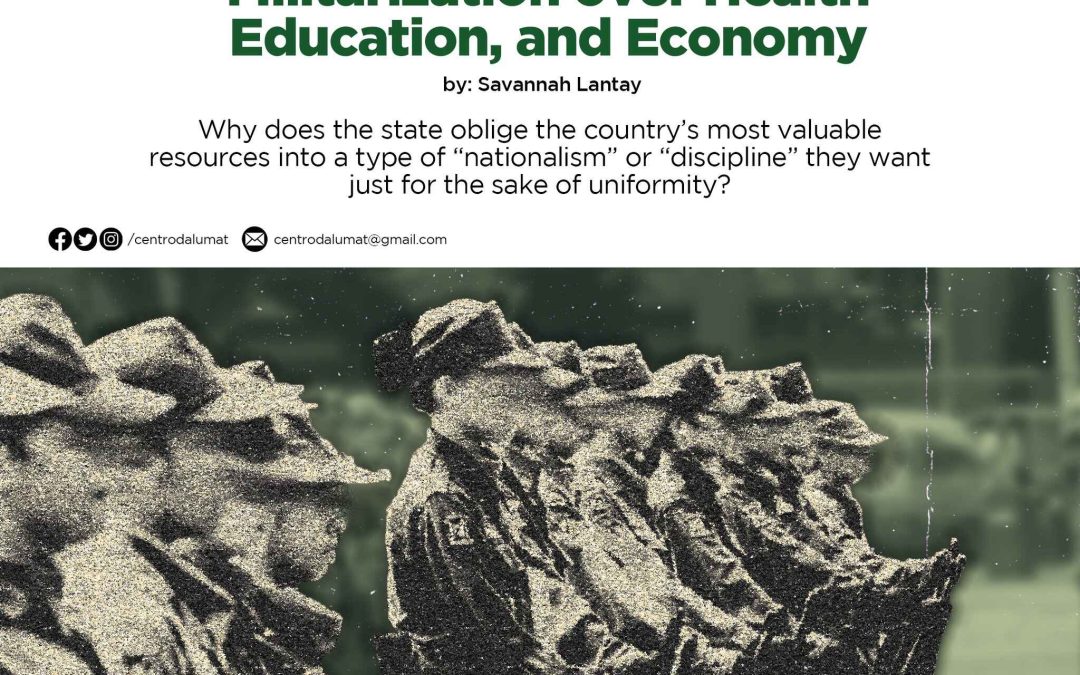“Kabataan ang Pag-asa ng Bayan.” Every Filipino is familiar with this saying. Dr. Jose Rizal, as one of our well-known heroes during the Spanish colonization, emphasized the role of youth in nation-building. We may have heard his words many times in school, but this quote undoubtedly inspired every young person to serve their country.
I guess this is why we value education so much. We see education as vital for us, the youth, to be equipped as productive members of society in the future. It cultivates us by helping us instill important knowledge and critical thinking skills. This is why education is a social necessity that no one should be deprived of. Everyone, especially the youth, must have the right to a quality and accessible one.
At the peak of the pandemic, the Philippine education system was gravely affected. Students, teachers, and parents were unprepared by the abrupt shift in mode of learning. They were forced to shift from face-to-face to online modes of learning and remote learning systems. For students like me, I had no choice but to shift to online learning, and for some who do not have access to the internet, they had to resort to self-learning academic modules. However, this setup became exhausting because learning was confined only to the internet spaces and physical modules. Consequently, students were deprived of any social interaction and relied mostly on social media, where they also expressed the exhaustion and stress that they felt under this learning setup. As a student myself, I can relate to my fellow students. In fact, I decided to pause schooling for a while because I was not able to cope with the fast-paced lessons.
Aside from students, teachers and other school workers were also affected by the impact of the pandemic on education. Just like my mother, who was a 58-year-old teacher back in 2020, she experienced difficulties navigating the online teaching platforms. Parents, on the other hand, had to double their efforts in guiding their children with their modules or online lessons.
For two years while suffering the pandemic, the youth’s education was indeed compromised.
Given the impacts of the crisis, the previous administration’s solution to the pandemic was the deployment of military forces to oversee quarantine measures. Surprisingly, health experts’ advice was ignored, as Duterte’s plans were more concerned with the economic consequences of the pandemic than with the overall health of the country. Quarantine measures were not as effective, and high COVID-19 cases continued to overwhelm the healthcare system. In addition, the previous administration failed the health sector, as many health workers called for an increase in wages because they were overworked and at high risk of virus exposure as well.
Despite all of the fiascos and criticisms about how the pandemic was handled, the former administration blatantly prioritized the implementation of Anti-Terror Law even in the midst of a global health crisis. Now, it seems that the Marcos administration prioritizes the same concern. With the repeal of the National Service Training Program and its replacement with mandatory ROTC, specifically its consolidated bill, the National Citizens’ Service Training Program Act (NCSTP), addressing the inadequacies in our economy, health care and education system is being disregarded, and militarization is being willingly prioritized—again.
On the recommendation of former President Duterte, President Marcos Jr. included the reinstatement of mandatory ROTC in his legislative agenda for this year. Initially, 27 bills were drafted in Congress for the repeal or amendment of NSTP before it was consolidated into a consensus bill.
The National Citizens Service Training Program Act, or House Bill 6486, would require students from universities, colleges, and technical-vocational schools to complete a 2-year National Citizens Service Training Program or a 4-year Reserve Officers Training Corps. According to legislators, this provides “comprehensive” civic duty training to students, which prepares them for any war, national emergencies, and disasters. This program differs from the NSTP in that the students have the freedom to choose what kind of civic duty they want to pursue. Students are also automatically conscripted into the National Service Reserve Corps and AFP Reserve Force after they graduate from college. Legislators say that this program seeks to instill nationalism and teach discipline among the youth. They also push for NCSTP rather than NSTP, as this is more “comprehensive.”
However, is the bill really urgent during this time when we are still recovering from the impact of the pandemic and in the midst of an economic crisis? How will the program be introduced in the curriculum when most colleges are still figuring out how to conduct hybrid or face-to-face classes? More importantly, because a tuition increase is required for implementation, this will only add to students’ financial problems.
What do the youth think about this new program, given that they are the most affected by this bill? Many student organizations expressed their concerns, yet they were completely disregarded. The program’s military component and the automatic conscription into the AFP reserve force were the primary concerns. With the previous cases of corruption and violence in Mandatory ROTC before, which led to its abolishment in 2001, how can the government assure us that it will never happen again in the new program? If there is a need for improvements like the inclusion of disaster risk management and response, I suppose we should just amend the NSTP law instead of completely repealing it.
Why does the state oblige the country’s most valuable resources into a type of “nationalism” or “discipline” they want just for the sake of uniformity? There are various ways that the youth can express their sense of nationalism—ways that do not violate their freedom.
More than ever, we call for an education that is quality, accessible, and COVID-safe, not a forced one.

